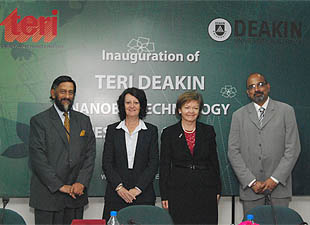Deakin & TERI Open Nanobiotechnology Lab In Gurgaon, India

Deakin University and The Energy and Resources Institute have opened a state-of-the-art nanotechnology laboratory in Gual Pahari, Gurgaon.
Called the TERI-Deakin Nanobiotechnology Research Center, the center was established based on a 2010 memorandum of understanding (MOU) between the two institutions.AsianScientist (Feb. 24, 2012) – Deakin University and The Energy and Resources Institute (TERI) officials inaugurated on Wednesday a new research facility in Gual Pahari, Gurgaon, located 35 minutes away by car from New Delhi.
Present at the signing ceremony were Hon’ble Louise Asher, MP and Minister for Innovation, Services & Small business, Minister for Tourism and Major Events, Australia; along with Professor Jane den Hollander, Vice Chancellor, Deakin University; and Dr. R. K. Pachauri, Director General of TERI.
“Research at TERI seeks to find solutions to problems related to attaining sustainability and environmental degradation and has made a difference to the lives of many people,” said Dr. Pachauri, Director-General, TERI.
The center will have a total of 70 researchers, and provide a hub for up to 50 Ph.D. students enrolled at Deakin University under the Deakin India Research Initiative (DIRI).
The new laboratory is expected to bring together Deakin University’s expertise in the design and characterization of novel nanomaterials and TERI’s experience in biotech applications, with the aim of providing solutions towards a greener and more advanced use of nanotechnology to tackle agricultural, biomedical, and sustainability issues.
Located at TERI Gram, scientists at the center will research into new formulations for coating seeds with nanomaterials and biological materials, synthesis of nanoparticles from waste, and understanding enhanced interaction and secondary metabolites production in a reactor system.
Other research projects include developing environment friendly ways of synthesizing nanoparticles using plants and microbes, innovative biofuels, and DNA-based nanocarriers or chimeric molecules for target specific gene delivery and drug therapy.
No comments:
Post a Comment